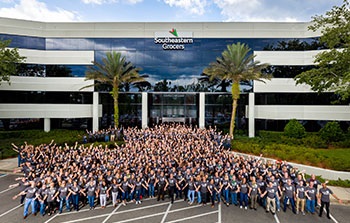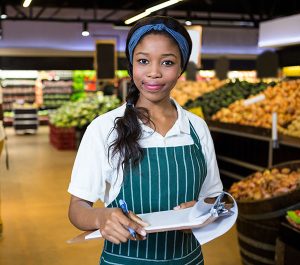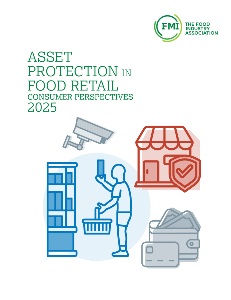<p>By Leslie G. Sarasin, President and CEO, FMI</p><img src="https://www.fmi.org/images/default-source/blog-images/seg-leaders.tmb-large-350-.jpg?sfvrsn=42180981_1" style="float:right;margin:10px;" class="-align-right" alt="SEG Leaders" sf-size="100" /><p>We serve an amazingly resilient and deeply caring industry made up of individuals who take the task of keeping the nation fed as more than a job; they consider it a noble calling. Currently our industry continues to struggle with residual issues the pandemic
has given us: ongoing challenge of supply chain issues; inflationary pressures; workforce shortages; and consumer concerns over higher food prices. These are like strands on a spider’s web – touch one and all are suddenly vibrating. And
there are a hundred more related stories I could tell, but just know these challenges are requiring us to redouble, improve, and adapt our efforts to advocate, educate, and collaborate on behalf of the industry. </p><p>I invited <a href="https://www.fmi.org/midwinter-conference">FMI Midwinter Executive Conference</a> Chair, Anthony Hucker, president and chief executive officer, <a href="https://www.segrocers.com/">Southeastern Grocers Inc. (SEG)</a>, to reflect on his own experiences
and the ways he upholds his commitment to putting people first in this turbulent business environment.</p><h5>Anthony, in this new era of grocery, we’ve come to recognize that the way consumers grocery shop has changed and will likely continue to do so. What key drivers do you believe are behind this and how do you see this “new normal” in the future?<b> </b></h5><p><b>Hucker</b>: During these past few years, we have all been faced with unimaginable challenges and we have learned the importance of being agile and attentive – particularly as customer preferences are constantly evolving. Like our fellow retailers,
we aren’t immune to the challenges that have affected the way our customers shop, such as inflation and supply chain issues. </p><p>We’re constantly analyzing and listening loudly to the transitional data provided by our customers, and we have found a primary shift in their shopping habits is seeking alternatives. While customers are making choices based on inflationary response,
they are also more open than ever to trying new products. Our customers’ product substitutions are often to find value within a specific category, but not necessarily with the goal of spending less on their total shop. We have found that our
customers are looking for ways to save on groceries without sacrificing the joy and adventure of trying a new trending recipe or beverage. That’s why our strategy continues to focus on providing a shopping experience that offers affordability,
quality and convenience. Recent trends have shown an increase in private label sales, higher engagement in loyalty programs that offer significant savings and the demand for ecommerce capabilities that provide both flexibility and affordability.
We’re certainly seeing the same in our business. Building trust through trial at a time when customers are most open to substitutions has resulted in an increased penetration in own brand products that shows us customers have found our SE Grocers
products offer quality as good as or better than national brands with a significantly lower everyday price guarantee. </p><p>We know quality and value have always been priorities for our customers and will continue to be as we face ongoing inflationary pressures and industry challenges. I believe that we as an industry have not only proven our resilience but have demonstrably
proven our skill for adaptation as well. So, even as customer behaviors evolve – and they will certainly do so in perpetuity – we as an industry are ideally positioned to keep fulfilling their expectations and forging a new path ahead. </p><h5>Anthony, your experiences in leadership span Aldi, Giant Food, Schnuck Markets, Walmart and now Southeastern Grocers. From your personal journey, what lessons have you learned, how have you applied them to optimize your workforce and what advice would you give others endeavoring to do the same?<b> </b></h5><p><b>Hucker</b>: With more than 30 years of experience in the retail industry, I’ve learned that with trust you can move mountains and make instrumental change. Our cultural transformation journey is a true testament to the power of trust. Throughout
this journey, we have empowered our people to be leaders of leaders and optimized our workforce to be efficient and commit to winning together. Our associates trust in our leadership and strategy, which has ultimately helped us rebuild trust with
our customers and communities. I always encourage people to find a company with strong values that align to your values. </p><p>Throughout my youth and professional career, I still believe that mother knows best, and my mother always told me, “You have two ears, two eyes, one mouth… use them in proportion.” That’s what I strive to do as a leader and encourage
SEG to do as a business. We refer to it as “listening loudly,” and that commitment informs practically every decision we make that could impact our associates, customers and communities. </p><p>As a people-first organization, we are proud of our company’s cultural transformation journey and will continue fostering a culture of belonging, inclusion and diversity. SEG was recently named to <i>Fortune</i>’s 2022 Best Workplaces in Retail
list, featured as the top supermarket in the retail space in <i>Newsweek</i>’s list of America’s Most Trusted Companies 2022 and certified as a 2022 Great Place to Work® for a third year in a row. Our team at SEG begins every day with
the commitment to put people first, because as I always say, “We are in the people business; we just happen to sell groceries.”</p><h5>Anthony, what are the most significant lessons you learned and put into practice having been faced with supply chain challenges over the last two and a half years spanning materials and ingredients, labor, equipment, transportation and trucking capacity, inventory control, cost pressures, and weather-related events?<b> </b></h5><p><b>Hucker</b>: All grocers recognize the impact ongoing supply chain, inflation, labor, raw material shortage and transportation challenges has had on customers, associates and community members. Through these challenges, we’ve learned that our
supply chain is bending, but it is not broken. Our well-experienced Merchandising and Supply Chain teams work diligently with our supplier partners to navigate and minimize ongoing pressures caused by these disruptions. Through these strong relationships,
we know we can count on our partners to help us deliver quality and affordability, and our associates and customers can count on us to be the most preferred neighborhood grocer. </p><p>As a grocer serving five coastal states in the Southeast, our decades of disaster response and hurricane preparation experience have strengthened both our capacity and capability in planning and providing for our communities during difficult times. People
are our greatest asset, and the safety of our associates, customers and neighbors is always our top priority as we help our communities through our natural disaster response: plan, protect and recover. This past hurricane season, our teams worked
around the clock with our supplier partners to ensure our shelves were stocked with storm essentials such as water, ice and nonperishable items for our customers to be safe and prepared. In response to Hurricane Ian, our supplier partners quickly
stepped up as did our disaster relief partners as we immediately activated recovery efforts in greatly impacted areas by opening mobile pharmacies and providing free water, ice, food and cleaning essentials to thousands in need. We learned that supporting
those in need meant providing both essentials to help rebuild the community and opportunities to reconnect and show each other kindness and a sense of normalcy following devastation. Our communities are resilient, and we embrace our responsibility
to provide support and relief during these great times of need, because we are stronger together. </p><p><a href="https://www.fmi.org/midwinter-conference" class="button">Learn More About Midwinter</a></p>
<p>By Leslie G. Sarasin, President and CEO, FMI</p><img src="https://www.fmi.org/images/default-source/blog-images/seg-leaders.tmb-large-350-.jpg?sfvrsn=42180981_1" style="float:right;margin:10px;" class="-align-right" alt="SEG Leaders" sf-size="100" /><p>We serve an amazingly resilient and deeply caring industry made up of individuals who take the task of keeping the nation fed as more than a job; they consider it a noble calling. Currently our industry continues to struggle with residual issues the pandemic
has given us: ongoing challenge of supply chain issues; inflationary pressures; workforce shortages; and consumer concerns over higher food prices. These are like strands on a spider’s web – touch one and all are suddenly vibrating. And
there are a hundred more related stories I could tell, but just know these challenges are requiring us to redouble, improve, and adapt our efforts to advocate, educate, and collaborate on behalf of the industry. </p><p>I invited <a href="https://www.fmi.org/midwinter-conference">FMI Midwinter Executive Conference</a> Chair, Anthony Hucker, president and chief executive officer, <a href="https://www.segrocers.com/">Southeastern Grocers Inc. (SEG)</a>, to reflect on his own experiences
and the ways he upholds his commitment to putting people first in this turbulent business environment.</p><h5>Anthony, in this new era of grocery, we’ve come to recognize that the way consumers grocery shop has changed and will likely continue to do so. What key drivers do you believe are behind this and how do you see this “new normal” in the future?<b> </b></h5><p><b>Hucker</b>: During these past few years, we have all been faced with unimaginable challenges and we have learned the importance of being agile and attentive – particularly as customer preferences are constantly evolving. Like our fellow retailers,
we aren’t immune to the challenges that have affected the way our customers shop, such as inflation and supply chain issues. </p><p>We’re constantly analyzing and listening loudly to the transitional data provided by our customers, and we have found a primary shift in their shopping habits is seeking alternatives. While customers are making choices based on inflationary response,
they are also more open than ever to trying new products. Our customers’ product substitutions are often to find value within a specific category, but not necessarily with the goal of spending less on their total shop. We have found that our
customers are looking for ways to save on groceries without sacrificing the joy and adventure of trying a new trending recipe or beverage. That’s why our strategy continues to focus on providing a shopping experience that offers affordability,
quality and convenience. Recent trends have shown an increase in private label sales, higher engagement in loyalty programs that offer significant savings and the demand for ecommerce capabilities that provide both flexibility and affordability.
We’re certainly seeing the same in our business. Building trust through trial at a time when customers are most open to substitutions has resulted in an increased penetration in own brand products that shows us customers have found our SE Grocers
products offer quality as good as or better than national brands with a significantly lower everyday price guarantee. </p><p>We know quality and value have always been priorities for our customers and will continue to be as we face ongoing inflationary pressures and industry challenges. I believe that we as an industry have not only proven our resilience but have demonstrably
proven our skill for adaptation as well. So, even as customer behaviors evolve – and they will certainly do so in perpetuity – we as an industry are ideally positioned to keep fulfilling their expectations and forging a new path ahead. </p><h5>Anthony, your experiences in leadership span Aldi, Giant Food, Schnuck Markets, Walmart and now Southeastern Grocers. From your personal journey, what lessons have you learned, how have you applied them to optimize your workforce and what advice would you give others endeavoring to do the same?<b> </b></h5><p><b>Hucker</b>: With more than 30 years of experience in the retail industry, I’ve learned that with trust you can move mountains and make instrumental change. Our cultural transformation journey is a true testament to the power of trust. Throughout
this journey, we have empowered our people to be leaders of leaders and optimized our workforce to be efficient and commit to winning together. Our associates trust in our leadership and strategy, which has ultimately helped us rebuild trust with
our customers and communities. I always encourage people to find a company with strong values that align to your values. </p><p>Throughout my youth and professional career, I still believe that mother knows best, and my mother always told me, “You have two ears, two eyes, one mouth… use them in proportion.” That’s what I strive to do as a leader and encourage
SEG to do as a business. We refer to it as “listening loudly,” and that commitment informs practically every decision we make that could impact our associates, customers and communities. </p><p>As a people-first organization, we are proud of our company’s cultural transformation journey and will continue fostering a culture of belonging, inclusion and diversity. SEG was recently named to <i>Fortune</i>’s 2022 Best Workplaces in Retail
list, featured as the top supermarket in the retail space in <i>Newsweek</i>’s list of America’s Most Trusted Companies 2022 and certified as a 2022 Great Place to Work® for a third year in a row. Our team at SEG begins every day with
the commitment to put people first, because as I always say, “We are in the people business; we just happen to sell groceries.”</p><h5>Anthony, what are the most significant lessons you learned and put into practice having been faced with supply chain challenges over the last two and a half years spanning materials and ingredients, labor, equipment, transportation and trucking capacity, inventory control, cost pressures, and weather-related events?<b> </b></h5><p><b>Hucker</b>: All grocers recognize the impact ongoing supply chain, inflation, labor, raw material shortage and transportation challenges has had on customers, associates and community members. Through these challenges, we’ve learned that our
supply chain is bending, but it is not broken. Our well-experienced Merchandising and Supply Chain teams work diligently with our supplier partners to navigate and minimize ongoing pressures caused by these disruptions. Through these strong relationships,
we know we can count on our partners to help us deliver quality and affordability, and our associates and customers can count on us to be the most preferred neighborhood grocer. </p><p>As a grocer serving five coastal states in the Southeast, our decades of disaster response and hurricane preparation experience have strengthened both our capacity and capability in planning and providing for our communities during difficult times. People
are our greatest asset, and the safety of our associates, customers and neighbors is always our top priority as we help our communities through our natural disaster response: plan, protect and recover. This past hurricane season, our teams worked
around the clock with our supplier partners to ensure our shelves were stocked with storm essentials such as water, ice and nonperishable items for our customers to be safe and prepared. In response to Hurricane Ian, our supplier partners quickly
stepped up as did our disaster relief partners as we immediately activated recovery efforts in greatly impacted areas by opening mobile pharmacies and providing free water, ice, food and cleaning essentials to thousands in need. We learned that supporting
those in need meant providing both essentials to help rebuild the community and opportunities to reconnect and show each other kindness and a sense of normalcy following devastation. Our communities are resilient, and we embrace our responsibility
to provide support and relief during these great times of need, because we are stronger together. </p><p><a href="https://www.fmi.org/midwinter-conference" class="button">Learn More About Midwinter</a></p>





